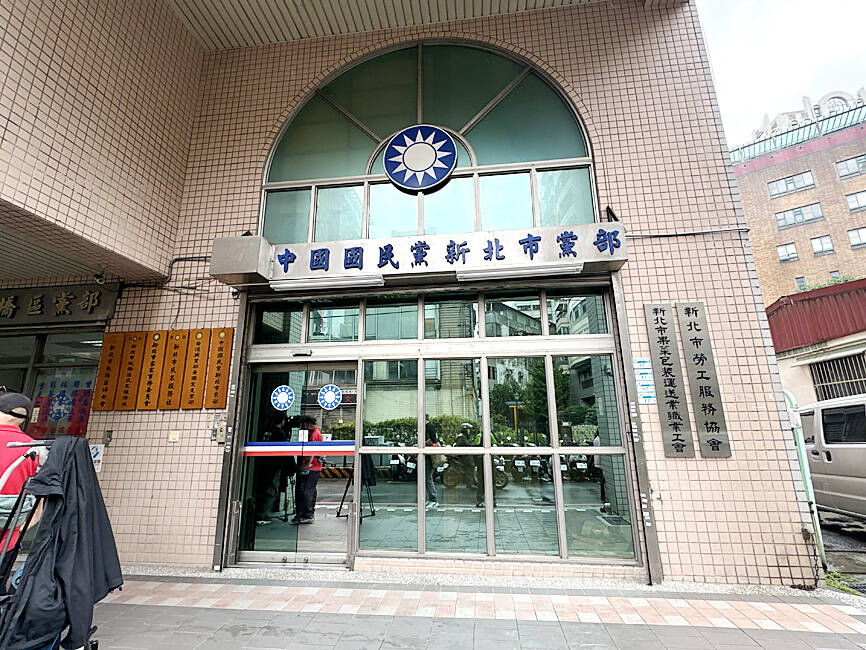Three staff members of the Chinese Nationalist Party’s (KMT) New Taipei City chapter were brought in for questioning by prosecutors yesterday in connection with allegedly falsified signatures in a recall campaign.
Searches were carried out on the office and the residences of the three people yesterday morning, following the launch of an investigation into reports of falsified personal information on recall petitions targeting Democratic Progressive Party (DPP) lawmakers.
Two of the staff were from the KMT’s office in Banciao District (板橋) — secretary-general Chen Chen-jung (陳貞容) and secretary Chu Pei-yi (朱蓓儀) — with the third being Sanchong District (三重) office executive director Lo Ta-yu (羅大宇), the KMT’s New Taipei City chapter said in a statement.

Photo: Tung Kuan-yi, Taipei Times
Chen and Chu, along with computers and other evidence, were taken from their homes by investigators this morning, chapter head Huang Chih-hsiung (黃志雄) said.
The party has already arranged legal assistance for them, Huang added.
KMT New Taipei City caucus secretary-general Wang Wei-yuan (王威元) called the search “political retaliation.”
The searches took place after Saturday’s protest organized by the opposition, strongly suggesting that these searches are a warning, Wang added.
The chapter said it respects the rule of law, but called for an impartial and law-abiding investigation.
The nationwide searches appeared to be politically motivated, Huang said, although he expressed respect for the judicial process.
Authorities should avoid unlawful investigative tactics that could intimidate citizens and undermine political expression, Huang added.
Meanwhile, prosecutors in Keelung conducted a separate search of a KMT office yesterday in connection with another case involving allegedly fake signatures in a recall campaign targeting two DPP city councilors, Cheng Wen-ting (鄭文婷) and Jiho Chang (張之豪).

The Coast Guard Administration (CGA) yesterday said it had deployed patrol vessels to expel a China Coast Guard ship and a Chinese fishing boat near Pratas Island (Dongsha Island, 東沙群島) in the South China Sea. The China Coast Guard vessel was 28 nautical miles (52km) northeast of Pratas at 6:15am on Thursday, approaching the island’s restricted waters, which extend 24 nautical miles from its shoreline, the CGA’s Dongsha-Nansha Branch said in a statement. The Tainan, a 2,000-tonne cutter, was deployed by the CGA to shadow the Chinese ship, which left the area at 2:39pm on Friday, the statement said. At 6:31pm on Friday,

The Chinese People’s Liberation Army Navy’s (PLAN) third aircraft carrier, the Fujian, would pose a steep challenge to Taiwan’s ability to defend itself against a full-scale invasion, a defense expert said yesterday. Institute of National Defense and Security Research analyst Chieh Chung (揭仲) made the comment hours after the PLAN confirmed the carrier recently passed through the Taiwan Strait to conduct “scientific research tests and training missions” in the South China Sea. China has two carriers in operation — the Liaoning and the Shandong — with the Fujian undergoing sea trials. Although the PLAN needs time to train the Fujian’s air wing and

The American Institute in Taiwan (AIT) put Taiwan in danger, Ma Ying-jeou Foundation director Hsiao Hsu-tsen (蕭旭岑) said yesterday, hours after the de facto US embassy said that Beijing had misinterpreted World War II-era documents to isolate Taiwan. The AIT’s comments harmed the Republic of China’s (ROC) national interests and contradicted a part of the “six assurances” stipulating that the US would not change its official position on Taiwan’s sovereignty, Hsiao said. The “six assurances,” which were given by then-US president Ronald Reagan to Taiwan in 1982, say that Washington would not set a date for ending arm sales to Taiwan, consult

A Taiwanese academic yesterday said that Chinese Ambassador to Denmark Wang Xuefeng (王雪峰) disrespected Denmark and Japan when he earlier this year allegedly asked Japan’s embassy to make Taiwan’s representatives leave an event in Copenhagen. The Danish-language Berlingske on Sunday reported the incident in an article with the headline “The emperor’s birthday ended in drama in Copenhagen: More conflict may be on the way between Denmark and China.” It said that on Feb. 26, the Japanese embassy in Denmark held an event for Japanese Emperor Naruhito’s birthday, with about 200 guests in attendance, including representatives from Taiwan. After addressing the Japanese hosts, Wang